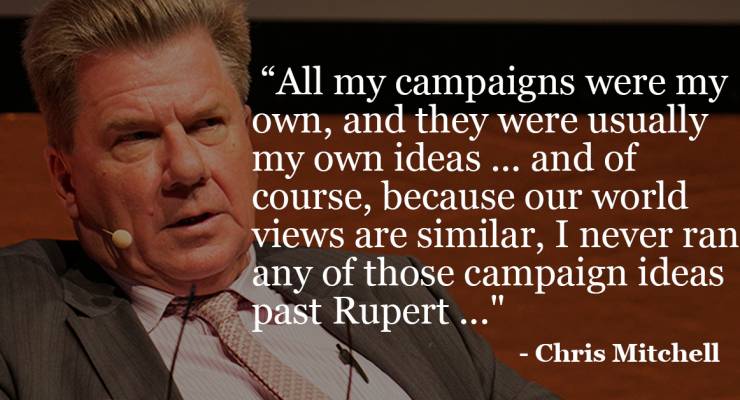
The architect of The Australian Holy Wars is a bluntly spoken, highly intelligent, intuitive newspaperman who adores Rupert Murdoch, despises the soft-left pretentiousness of rivals Fairfax and the ABC, and loves ink on paper.
In 2002, when he became The Australian‘s editor-in-chief, Chris Mitchell harnessed all those passions to create what he describes as a “campaigning” newspaper — and, in the process, changed the ethical framework of Australian journalism forever.

He insists the paper he moulded and led for 14 years (he retired in 2015) is not driven by politics or ideology, but by values. “Readers not familiar with The Australian might believe some of the nonsense spread by critics on the Left of politics about the paper’s ideology,” Mitchell writes in his memoir Making Headlines, published last year. “In truth the paper has no party political persuasion but stands for a set of values designed to make our nation more prosperous and more powerful.”
If you believe Mitchell, The Australian became a vehicle for personalised, nasty, biased, often vicious campaigns against a whole cast of individuals because it believes in “a set of values”. (And maybe, along the way, to get noticed and talked about?).
“While the entire media world fights for ever-declining cents for marginal clicks on mobile devices by Generation Ys who have no money,” Mitchell writes, “I have focused relentlessly on the interests of the richest generation in world history, and I think the premium display broadsheet advertising now booming in The Australian‘s print editions is testament to the wisdom of that strategy.”
Mitchell’s justification for The Australian becoming effectively a newspaper of Holy Wars is that he wanted it to stand for something (unlike, he says, The Guardian and the Fairfax papers).
“All my campaigns were my own, and they were usually my own ideas,” he writes. “And of course, because our world views are similar, I never ran any of those campaign ideas past Rupert; nor did I ever receive criticism — or indeed praise — from him for any of those campaigns. Not a single one in 24 years as an editor.”
And he believes the campaigns are what readers stay with the paper for: “My version of The Australian was often criticised for the length and focus of its campaigns … For me, this raises a serious issue about the decline of modern editing and reporting … Many of these have lasted more than two years and some more than a decade. Yet they have been the big winners for the paper in the eyes of its loyal readership.”
As a loyal News Corp warrior, Mitchell likens the editor’s role to a general overseeing a battlefield — according to his version of advice given to now-Australian editor-in-chief Paul Whittaker, when the latter was first appointed editor of the racy tabloid Daily Telegraph. And he pits that approach directly against that of outfits like The Guardian:
“Things are different at News Corp, where the editors really do run their own papers and websites. Ideas are still driven from morning conference, and chiefs of staff still assign stories to reporters on the basis of conference decisions … this is how newsrooms have been run for a hundred years, and it is exactly how Fleet Street’s papers operate — apart from The Guardian, which has always been run as a kind of reporters’ collective. At The Guardian everyone has the same views and agenda so everyone knows that everything they write will be pleasing to The Guardian’s readers. At News, the editors run the papers in the same way the world’s great newspapers have always been run.”
In the eyes of their creator, the Holy Wars are a brilliant confirmation that The Australian has a set of values that makes it one of the great newspapers of the world.
TOMORROW: The war against Gillian Triggs








Crikey is committed to hosting lively discussions. Help us keep the conversation useful, interesting and welcoming. We aim to publish comments quickly in the interest of promoting robust conversation, but we’re a small team and we deploy filters to protect against legal risk. Occasionally your comment may be held up while we review, but we’re working as fast as we can to keep the conversation rolling.
The Crikey comment section is members-only content. Please subscribe to leave a comment.
The Crikey comment section is members-only content. Please login to leave a comment.